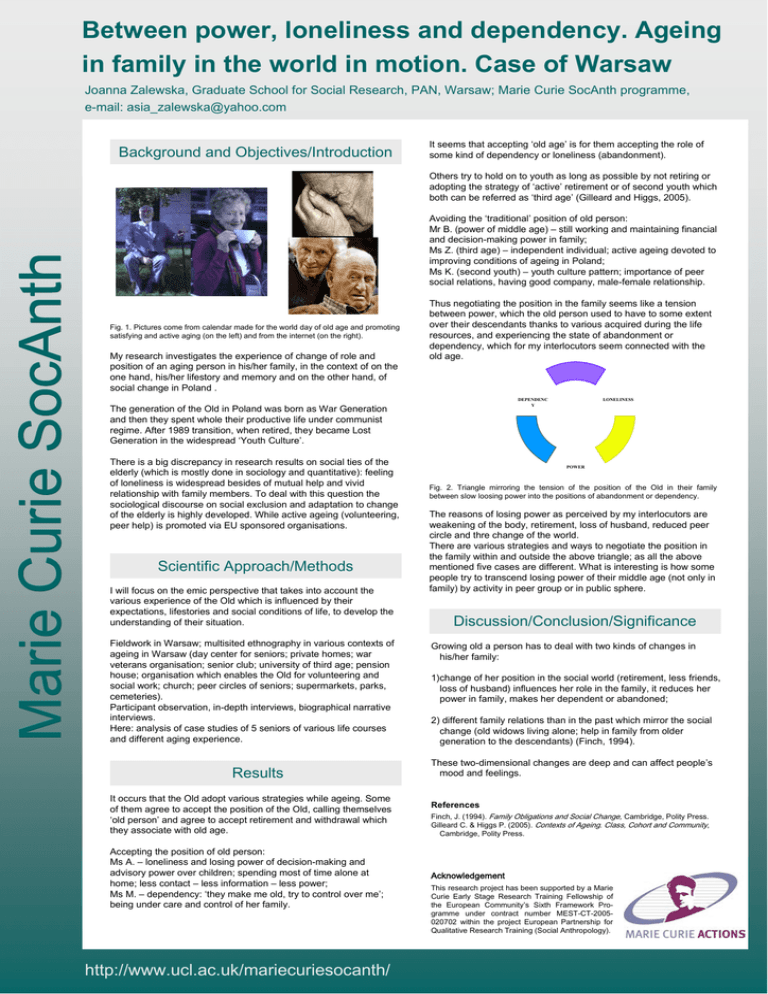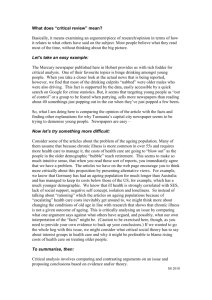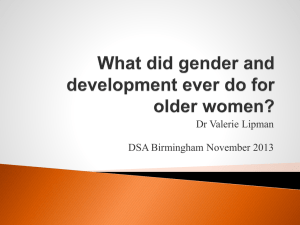Between power, loneliness and dependency. Ageing
advertisement

Between power, loneliness and dependency. Ageing in family in the world in motion. Case of Warsaw Joanna Zalewska, Graduate School for Social Research, PAN, Warsaw; Marie Curie SocAnth programme, e-mail: asia_zalewska@yahoo.com Background and Objectives/Introduction It seems that accepting ‘old age’ age’ is for them accepting the role of some kind of dependency or loneliness (abandonment). Others try to hold on to youth as long as possible by not retiring retiring or adopting the strategy of ‘active’ active’ retirement or of second youth which both can be referred as ‘third age’ age’ (Gilleard and Higgs, 2005). Avoiding the ‘traditional’ traditional’ position of old person: Mr B. (power of middle age) – still working and maintaining financial and decisiondecision-making power in family; Ms Z. (third age) – independent individual; active ageing devoted to improving conditions of ageing in Poland; Ms K. (second youth) – youth culture pattern; importance of peer social relations, having good company, malemale-female relationship. Fig. 1. Pictures come from calendar made for the world day of old old age and promoting satisfying and active aging (on the left) and from the internet (on the right). My research investigates the experience of change of role and position of an aging person in his/her family, in the context of on the one hand, his/her lifestory and memory and on the other hand, of social change in Poland . Thus negotiating the position in the family seems like a tension between power, which the old person used to have to some extent over their descendants thanks to various acquired during the life life resources, and experiencing the state of abandonment or dependency, which for my interlocutors seem connected with the old age. DEPENDENC Y The generation of the Old in Poland was born as War Generation and then they spent whole their productive life under communist regime. After 1989 transition, when retired, they became Lost Generation in the widespread ‘Youth Culture’ Culture’. There is a big discrepancy in research results on social ties of the elderly (which is mostly done in sociology and quantitative): feeling feeling of loneliness is widespread besides of mutual help and vivid relationship with family members. To deal with this question the sociological discourse on social exclusion and adaptation to change change of the elderly is highly developed. While active ageing (volunteering, (volunteering, peer help) is promoted via EU sponsored organisations. Scientific Approach/Methods I will focus on the emic perspective that takes into account the various experience of the Old which is influenced by their expectations, lifestories and social conditions of life, to develop the understanding of their situation. Fieldwork in Warsaw; multisited ethnography in various contexts of ageing in Warsaw (day center for seniors; private homes; war veterans organisation; senior club; university of third age; pension pension house; organisation which enables the Old for volunteering and social work; church; peer circles of seniors; supermarkets, parks, parks, cemeteries). Participant observation, inin-depth interviews, biographical narrative interviews. Here: analysis of case studies of 5 seniors of various life courses and different aging experience. experience. Results It occurs that the Old adopt various strategies while ageing. Some Some of them agree to accept the position of the Old, calling themselves themselves ‘old person’ person’ and agree to accept retirement and withdrawal which they associate with old age. Accepting the position of old person: Ms A. – loneliness and losing power of decisiondecision-making and advisory power over children; spending most of time alone at home; less contact – less information – less power; Ms M. – dependency: ‘they make me old, try to control over me’ me’; being under care and control of her family. http://www.ucl.ac.uk/mariecuriesocanth/ LONELINESS POWER Fig. 2. Triangle mirroring the tension of the position of the Old in their family between slow loosing power into the positions of abandonment or dependency. The reasons of losing power as perceived by my interlocutors are weakening of the body, retirement, loss of husband, reduced peer circle and thre change of the world. There are various strategies and ways to negotiate the position in the family within and outside the above triangle; as all the above mentioned five cases are different. What is interesting is how some people try to transcend losing power of their middle age (not only in family) by activity in peer group or in public sphere. Discussion/Conclusion/Significance Growing old a person has to deal with two kinds of changes in his/her family: 1)change of her position in the social world (retirement, less friends, loss of husband) influences her role in the family, it reduces her power in family, makes her dependent or abandoned; 2) different family relations than in the past which mirror the social change (old widows living alone; help in family from older generation to the descendants) (Finch, 1994). These two-dimensional changes are deep and can affect people’s mood and feelings. References Finch, J. (1994). Family Obligations and Social Change, Cambridge, Polity Press. Gilleard C. & Higgs P. (2005). Contexts of Ageing. Class, Cohort and Community, Cambridge, Polity Press. Acknowledgement This research project has been supported by a Marie Curie Early Stage Research Training Fellowship of the European Community’s Sixth Framework Programme under contract number MEST-CT-2005020702 within the project European Partnership for Qualitative Research Training (Social Anthropology).



